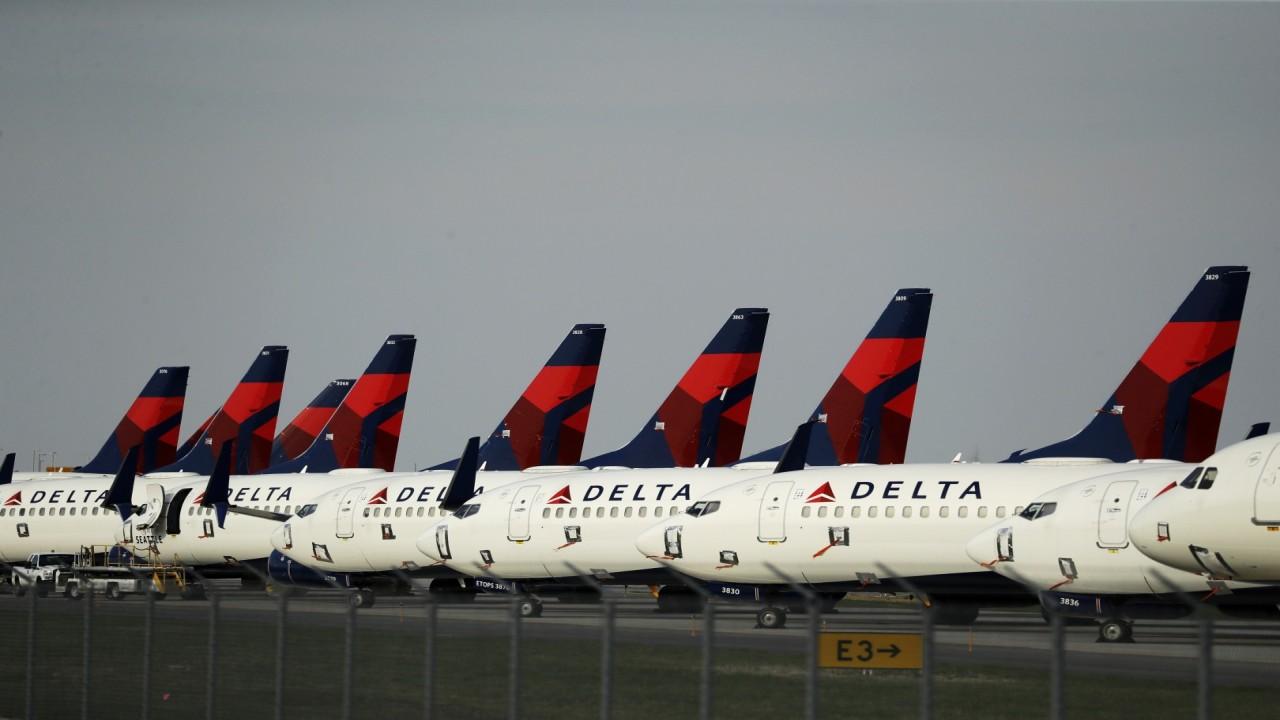Delta, United CEOs forecast the return of business travel
The comments came as the two airlines posted wide earnings losses for the third quarter as demand continues to be slammed by the coronavirus.
Delta Air Lines' and United Airlines' respective leadership are predicting very different timelines as to when exactly business travel's full recovery from the coronavirus pandemic could happen.
DELTA POSTS $5.4B LOSS AS CORONAVIRUS PANDEMIC BATTERS AIRLINE INDUSTRY
Delta Air Lines president Glen Hauenstein said the company believes the pandemic's impact on business travel would be behind them in "two years or more."
“With a slow and steady build in demand, we are restoring flying to meet our customers’ needs, while staying nimble with our capacity in light of COVID-19,” Hauenstein said in the company's earnings release. “While it may be two years or more until we see a normalized revenue environment, by restoring customer confidence in travel and building customer loyalty now, we are creating the foundation for sustainable future revenue growth.”
Delta's CEO Ed Bastian noted on the company's conference call for its third quarter earnings that roughly 90% of its primary corporate customers have business travelers who are traveling in small numbers, but are "getting their own sense for what the new travel experiences is," and that they are ultimately coming back to Delta with "really strong reviews of safety and confidence in restoring their travel spend."
While video-conferencing platforms like Zoom and Google Meet have served as an alternative to traditional business travel during the pandemic, Bastian doesn't forsee it outright replacing traditional business travel.
"I am of the view that it will have some impact, but it’s not going to be a substitute, it will be a complement to business travel," Bastian said. "My sense is that we could be looking at anywhere from 10% to 20% reduction in the next couple of years when we get to that new normal of business travel."
Bastian noted that in his more than 20-year career dealing with crises, business travel has always come back stronger than anticipated despite what critics say.
"I think we are going to see that same consumer behavior, it will undoubtedly be different, but I think it’s going to come stronger than most of the pundits’ view," he said.
PUSH FOR MORE AIRLINE AID GAINS TRACTION AS INDUSTRY WARNS OF MORE JOB CUTS
United CEO Scott Kirby on the other hand, warned that while demand for corporate flights should start to recover by late 2021 or early 2022, a full return to normal levels for the airline's business travel isn't likely until 2024.
“I think it will come back to normal,” Kirby said on the earnings call. “I’ve been fond of saying the first time someone loses a sale to a competitor who showed up in person is the last time they try to make a sales call on Zoom.”
“Business travel is incredibly important, really important,” he added. “It was our bread and butter before I think it will be our bread and butter in the future.”
Still, Kirby is confident that United will make "a decade worth of progress during the pandemic" and emerge as the world's number one business class airline when the dust settles.
"I think we will have picked up share, frankly," Bastian said. "So, don't even have to come back for 100% for that to be really successful for United."
However, he acknowledged the outlook for business travel isn't definite and that United is "staying flexible."
"We recognize that that's not the certainty, what I just described, and if it's wrong, we won't do it. And we won't go there," Kirby added. "But that's my guess for what's going to happen that business travel demand is going to recover and United is disproportionately going to win in that environment."
United Chief Commercial Officer Andrew Nocella added that its business traffic in markets like New York, Washington, D.C., San Francisco, Los Angeles, Chicago and, to some extent, Houston are particularly expected to "bounce back quicker and stronger" to allow United to get back to flying faster than its competitors.
GET FOX BUSINESS ON THE GO BY CLICKING HERE
The comments come following Delta posting a $5.38 billion loss in the third quarter compared to a profit of $1.5 billion a year ago. The airline reduced its cash-burn rate to $18.4 million a day in September from $26.1 million in July and August, and Bastian predicted it could reach break-even cash flow by spring.
As for United, the airline reported a $1.8 billion net loss and $2.8 billion adjusted loss for the third quarter, and cut its daily cash burn to $25 million a day, including debt and severance payments, down from an average of $40 million a day in the previous quarter.
| Ticker | Security | Last | Change | Change % |
|---|---|---|---|---|
| DAL | DELTA AIR LINES INC. | 67.44 | -3.67 | -5.15% |
| UAL | UNITED AIRLINES HOLDINGS INC. | 110.05 | -6.88 | -5.88% |
The struggling airline industry has been urging Congress to pass a new round of stimulus to help mitigate the financial blow, but lawmakers remain gridlocked on Capitol Hill over the price tag of a new package.
Lawmakers previously passed the $2.2 trillion CARES Act in March, which gave $25 billion to the airlines in order to stay afloat during the pandemic and keep their workers on the payroll. However, the aid expired on Oct. 1, and without a new extension on relief, United has been forced to begin furloughing about 13,000 workers. Delta, meanwhile, has delayed furloughs for up to 2,000 pilots until at least Nov. 1.




















